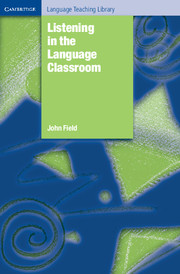Book contents
- Frontmatter
- Contents
- Dedication
- Acknowledgements
- Introduction
- Part I Background
- Part II Rethinking the comprehension approach
- Part III Process, not product
- Part IV A process view of listening
- 8 Input and context
- 9 Decoding and the inconsistent signal
- 10 Decoding: sounds, syllables and words
- 11 Using grammar and intonation
- 12 Amplifying what the speaker says
- 13 Handling information
- Part V The challenge of the real world
- Part VI Conclusion
- Appendices
- Glossary of listening-related terms
- References
- Index
- References
10 - Decoding: sounds, syllables and words
Published online by Cambridge University Press: 01 October 2009
- Frontmatter
- Contents
- Dedication
- Acknowledgements
- Introduction
- Part I Background
- Part II Rethinking the comprehension approach
- Part III Process, not product
- Part IV A process view of listening
- 8 Input and context
- 9 Decoding and the inconsistent signal
- 10 Decoding: sounds, syllables and words
- 11 Using grammar and intonation
- 12 Amplifying what the speaker says
- 13 Handling information
- Part V The challenge of the real world
- Part VI Conclusion
- Appendices
- Glossary of listening-related terms
- References
- Index
- References
Summary
If you wish to know the mind of a man, listen to his words.
Chinese proverbWe have seen that the information provided by the speech signal is at best inconsistent and at worst misleading. So how does a first language listener succeed in making sense of the input that meets her ear? And in what ways is the decoding technique of a second language listener likely to differ from that of the first? Our exploration of decoding now moves from the raw material that reaches the listener's ear to the processes that an expert listener employs in order to make sense of it.
It is worth recalling that an important part of the decoding operation entails matching: making a connection between clusters of acoustic cues and the listener's knowledge of units (phonemes, words and grammatical patterns) of the language being heard. How that matching operation takes place will be the main theme of the present chapter. We start by trying to answer the crucial question of how a listener manages to connect speech that is so variable with the standard forms of words. We consider some explanations that have been proposed and their implications for the listening teacher. We then go on to examine the matching process in relation to units of various sizes: beginning with phonemes and moving on to syllables and words.
- Type
- Chapter
- Information
- Listening in the Language Classroom , pp. 163 - 184Publisher: Cambridge University PressPrint publication year: 2009



